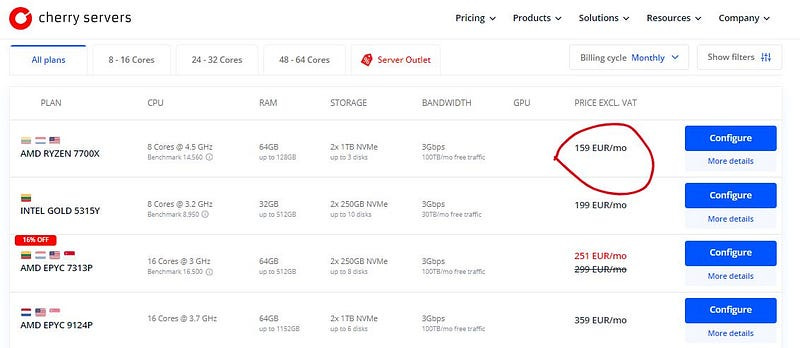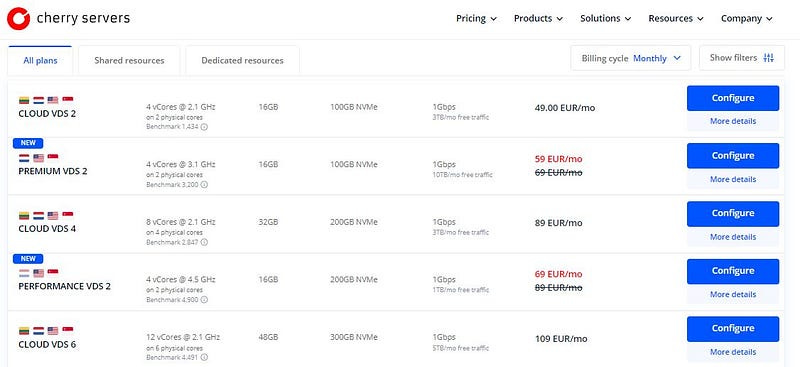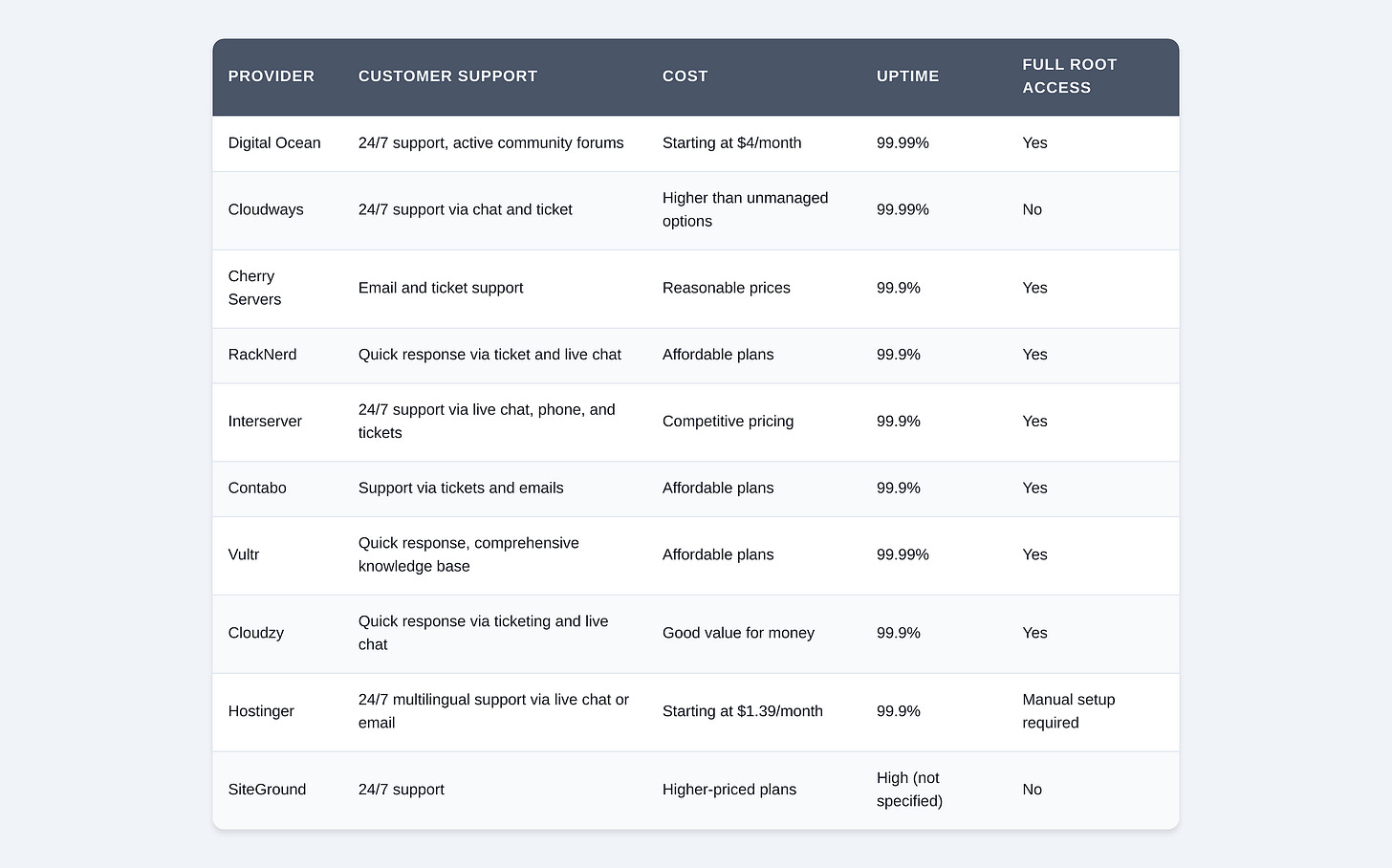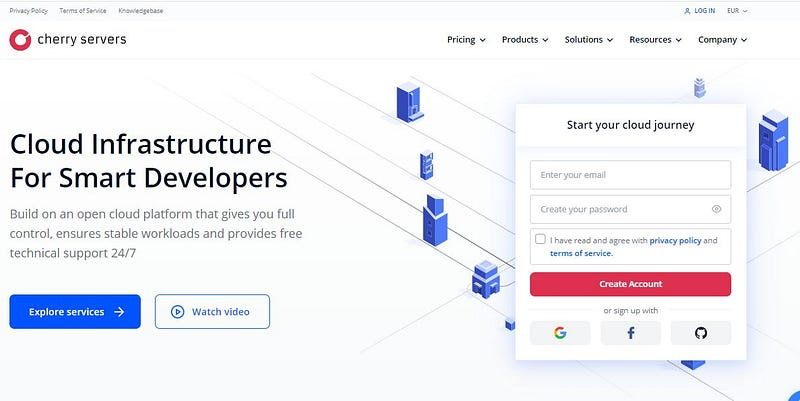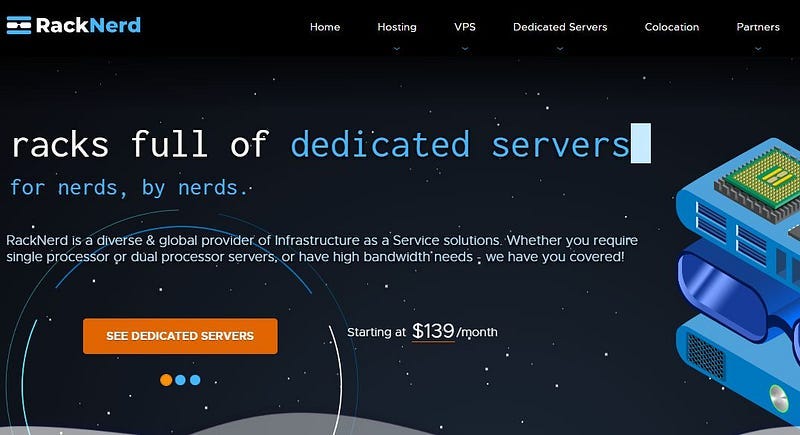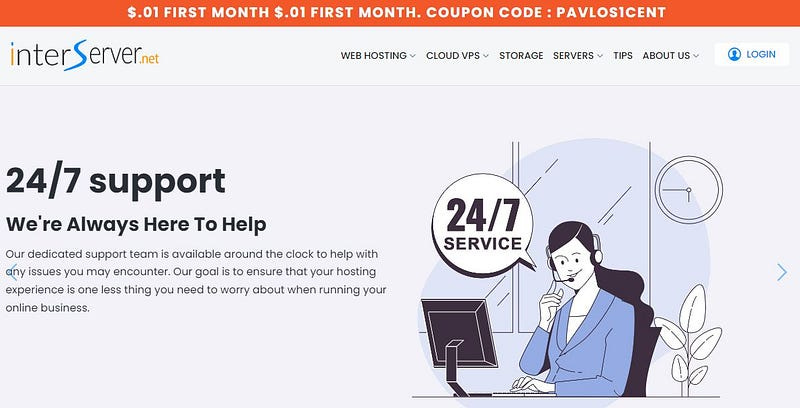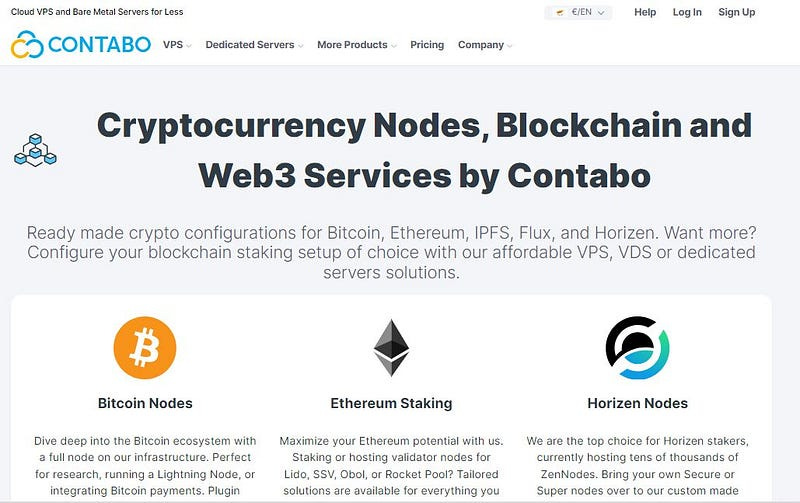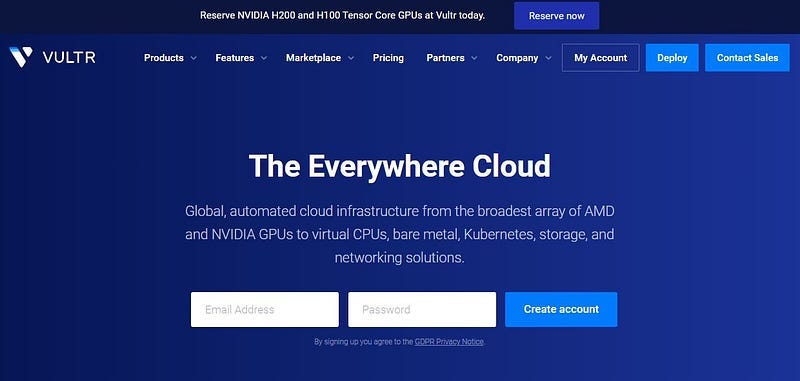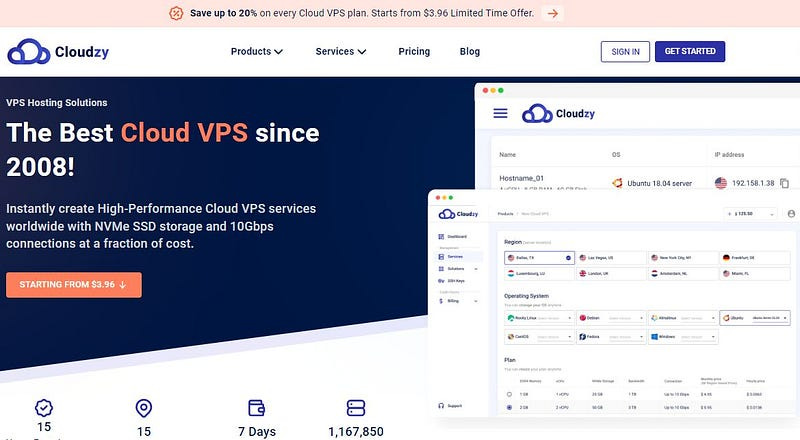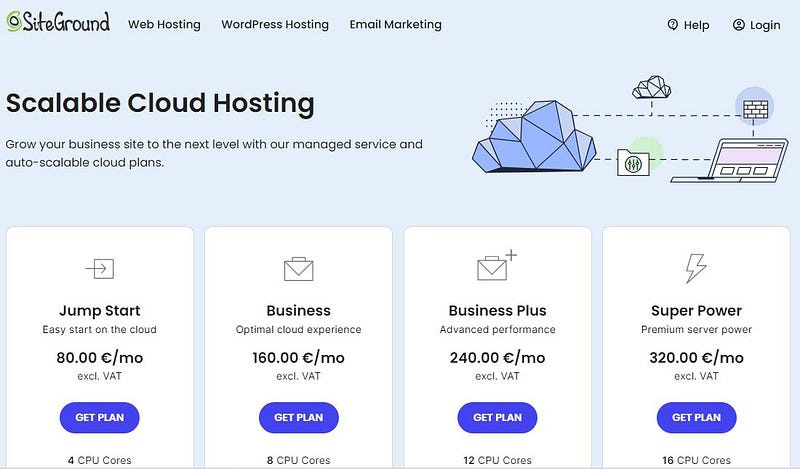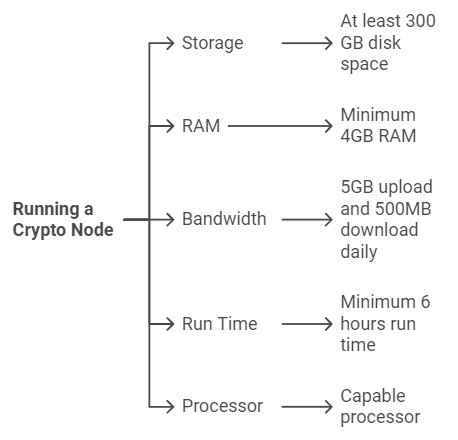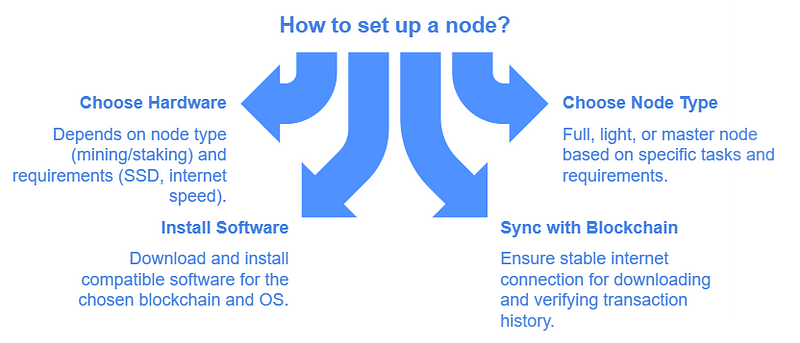10 Best Hosting Providers for Running Blockchain Nodes
Hosting blockchain nodes? I researched 10 providers that offer unmatched uptime, crucial root access, and value service.
Hosting blockchain nodes? I researched 10 providers that offer unmatched uptime, crucial root access, and value service.
⭐ Click here for free access (available for non-paying Medium members)
DISCLAIMER: This article may contain affiliate links. If you choose to
use these links to make a purchase, I may earn a commission at no extra
cost to you. This helps support the creation of more educational content,
but it does not influence my opinions or information presented in this
article.In this post, I will share my research on choosing the best hosting provider for running blockchain nodes.
I discovered that blockchain nodes can bring in semi-passive income, so I’m adding this method to my 2025 passive income generation plan.
Now, there are over 300.000 (yes, 300 THOUSAND) hosting companies in the world — as of 2024, so I had to research a bit. [1]
Through my research (and experience), I’ve narrowed down the top 10 hosting options that offer great reliability, helpful customer support, and important control features.
Before we dive into the details of each provider, we’ll explore the key factors you should consider when selecting a host for your blockchain nodes.
By the way, if you want to skip reading the whole post here are (in my opinion) the top 10 hosting providers for running Blockchain Nodes.
Best Types of Node Hosting Services
So, when you’re looking to host your blockchain node, you’ve got two main options:
Going with a cloud-based service or
Using a dedicated server.
Let’s talk about why cloud-based hosting might be the way to go.
First off, it’s super flexible.
You can easily adjust your resources as you need, without having to mess around with upgrading hardware.
This makes it a great choice if you’re just starting out or if your workload tends to fluctuate.
On top of that, it’s usually more budget-friendly. You don’t have to invest in your own expensive equipment, and you only pay for what you use.
For example, here’s a simple comparison of renting a dedicated server vs getting a cloud hosting plan from Cherry Servers— one of the hosting providers I mention below.
Cherry servers dedicated plans start from 159 euro per month.
On the other hand, Cherry Servers Cloud hosting plans start from just 49 euros per month.
Anyway, this can be a big relief, especially if you’re working with limited funds — like me.
Plus, when you go with a cloud provider, they take care of most of the technical heavy lifting. This means you don’t have to worry about all the nitty-gritty of setting up and maintaining your node.
Having said that, through my research I discovered that it is best to move forward with a Cloud Hosting plan. So, the hosting suggestions below are focused on hosting providers with Cloud Hosting plans.
How I Chose The Following Node Hosting Providers
During my search I quickly realized that there are some specific traits that I need to focus on:
There are a few key things that really matter when you’re looking for a place to host your crypto nodes.
First off, having great customer support is a must for me. I want to know that they’ll be there to help me out whenever I consider my self a novice tech guy that is why I need all the support I can get.
Another big factor is getting good value for my money. With so many options out there, I’m looking for a provider that offers a balance of affordability and useful features. I am not looking for the cheapest I am looking for the best features with the best values.
Uptime is also super important. I can’t afford to have my server going down and missing out on potential earnings or wasting my time dealing with reboots. It needs to be reliable.
Lastly, I need to have full control over my server with root access. Without that, I’d be stuck relying on support agents every time I need to make a change, and that’s just not gonna work for me.
Best hosting for running crypto nodes
Now, that we’ve got that out of the way, let’s jump straight to the the best hosting providers for running crypto nodes:
(I’ve made this easy to “consume” table that compares all my options)
1. Digital Ocean
Digital Ocean is a great choice for hosting your crypto nodes. It’s affordable, with plans starting at just $4 a month, which is perfect if you’re looking to make some semi-passive income from blockchain nodes.
Plus, you don’t have to worry about your nodes going down because they’ve a 99.99% server uptime according to various reviews I’ve read online.
And if you do run into any issues, their 24/7 customer support and active community forums are there to help, although response times can vary.
What I really like about Digital Ocean is that you get full root access, so you can configure your server exactly how you want it. This means you have the freedom to set everything up to maximize your earnings from your crypto nodes.
I prefer a live support agent — but, unless I try their 24/7 customer support I can’t express my own opinion.
2. Cloudways
Cloudways seems like a solid option for hosting my crypto nodes. From what I’ve learned, they offer a good mix of speed and ease of use.
One thing that caught my attention is their 24/7 support. Even though I haven’t tried them yet, it’s comforting to know that help will be there whenever I need it, especially when setting up something important like a blockchain node.
Their prices are a bit higher than some other services that don’t manage everything for you, but the extra help seems worth it. With a 99.99% uptime guarantee, I wouldn’t have to worry about my nodes going down.
While they don’t give full control through root access because it’s a managed service, I think I’ll still be able to do everything I need without feeling limited.
3. Cherry Servers
Cherry Servers seems like another strong option for hosting blockchain nodes.
On review sites, they’re known for being quick to respond when you need help. You can easily email them or open a ticket, and they’ll provide personalized support.
Plus, they don’t charge an arm and a leg. The prices are totally reasonable for what you’re getting.
And you can count on your nodes being up and running pretty much all the time — they boast a 99.9% uptime rate which is pretty impressive.
Finally, with root access, you can set everything up just the way you want, giving you more control over your setup.
4. RackNerd
RackNerd is another great option for hosting your cryptocurrency nodes.
I’ve been using one of their shared hosting plans for the past one and a half year (check my review), and their customer service has been fantastic. They respond quickly, whether through live chat or a support ticket.
What’s great is that their pricing is affordable without cutting corners on quality. They’ve got a solid 99.9% uptime, so your nodes should stay up and running smoothly.
At least my shared hosting plan does.
Plus, RackNerd offers root access, giving you full control over how you manage your servers.
5. Interserver
Interserver is looking like another solid option for hosting cryptocurrency nodes.
From what I’ve gathered, they offer 24/7 customer support through live chat, phone, and tickets, which is a big plus when you need quick help.
While I haven’t used them myself yet, it’s good to know they’re responsive.
Their plans are budget-friendly without skimping on features, which makes them competitive compared to other options.
They also offer dedicated GPU servers for those who need extra processing power for tasks like complex simulations or machine learning. Their GPU servers are built with the latest hardware, including NVIDIA GPUs, and come with flexible configurations, so you can choose what works best for your specific needs.
Anyways, they also have a solid uptime record of 99.9%, according to reviews I’ve read online, meaning my nodes should run smoothly most of the time.
What’s really appealing is that they offer root access, giving me complete control over how I manage my servers.
6. Contabo
I’ve got to say, Contabo seems like a solid choice for hosting blockchain nodes.
Their plans are affordable and give you great value, which is awesome if you’re aiming to make the most of your node-running adventures.
Sure, their customer support might not be the fastest since they rely mainly on tickets and emails, but given the overall benefits, that’s not too much of a downside.
Plus, they claim 99.9% uptime, which people online seem to agree with.
And hey, they give you complete control over your server with root access, so that’s a big thumbs-up! 👍
On top of that, Contabo offers setups for different blockchain projects.
Whether you’re interested in Bitcoin, Ethereum staking, or other platforms like Horizen and IPFS, they’ve got options.
They claim they 7% off all Bitcoin nodes — which is huge in my opinion and adds up to my trust factor.
7. Vultr
Another option on my radar for hosting blockchain nodes is Vultr. They offer solutions specifically designed for blockchain needs, with an infrastructure that’s built for high performance.
Their powerful servers and fast network connectivity are crucial for handling the demands of blockchain applications.
They have data centers in 32 locations across six continents, which helps keep your applications running smoothly worldwide.
I find Vultr’s flexibility quite appealing. You can set up nodes as either bare metal servers or virtual machines, depending on your preference.
Plus, there are different Linux operating systems to choose from, or you can upload your own custom setups. They also offer automated solutions with direct hardware access, which is useful for consistent performance.
Vultr seems to be embracing the Web 3.0 trend, supporting projects focused on decentralization and privacy.
Their services also fit well with financial services, providing scalability for handling market changes and transaction spikes.
Starting with Vultr is easy — you just sign up for a free account, and their sales team can offer personalized assistance. Their customer support is known for quick responses, and they provide a user-friendly knowledge base.
Based on my research, Vultr offers reliable service with around 99.99% uptime, and their plans are affordable without sacrificing quality.
Plus, they give you full control over your server, allowing you to customize as needed.
All this makes Vultr a strong contender in my search for the right blockchain node hosting solution.
8. Cloudzy
Moving on with our list of potential options for hosting your crypto node, let’s talk about Cloudzy.
If quick customer service is important to you, they seem to have it covered with both ticketing and live chat support.
Plus, their pricing starts at just $4.95 per month, which is pretty wallet-friendly. You can count on your node staying up and running smoothly with a solid uptime promise of 99.95% — according to online reviews.
Cloudzy offers flexibility in payments, accepting both traditional methods like credit cards and PayPal, as well as cryptocurrencies like Bitcoin and Ethereum.
Whether you’re into Bitcoin or Ethereum, their VPS options provide high-speed performance with NVMe SSD storage and DDR4 RAM. And if you like having full control, they’ve got you covered with root access.
Also, if you’re thinking about masternodes, Cloudzy offers a cost-effective solution with competitive pricing and a 14-day money-back guarantee.
They even have a user-friendly control panel, making it easier to adjust resources as needed.
So, while I’m still in research mode, Cloudzy seems like a strong contender for anyone serious about managing blockchain nodes.
9. Hostinger
Moving on from Cloudzy, let’s dive into Hostinger, which I’m currently using and really satisfied with.
If you’re hunting for an affordable way to host a crypto node, Hostinger’s worth considering.
Their prices kick off at $2.99 a month, which feels like a steal given the quality. A standout feature of Hostinger is their 24/7 customer support — always there when you need them, in multiple languages, via live chat or email.
Reliability is a big deal, and Hostinger promises 99.9% uptime, which they seem to deliver on.
This is crucial for blockchain nodes, especially with Proof of Stake, where uptime is essential. With Hostinger’s VPS plans, you get the flexibility to adjust resources like CPU and RAM as needed, which is super useful.
Security-wise, Hostinger offers DDoS protection and SSL certificates to keep your nodes safe. You do get root access, but it requires some manual setup, allowing you to configure your server how you like.
Keep in mind, though, running a VPS takes some tech skills. Plus, while VPS is cost-effective, it might not match the performance of dedicated servers tailored for blockchain.
As I keep exploring options, Hostinger is definitely a contender. Given my positive experience with their shared hosting, I’m excited about their potential for blockchain nodes.
10. SiteGround
Finally, if you’re looking for a great place to host your crypto nodes, let me tell you about SiteGround.
I’ve had a good experience with their shared hosting plan, especially because their customer support is, hands down, one of the best out there. They’re available 24/7, ready to help whenever you need it.
I did leave them because of their high renewal fees, but the quality of service was top-notch.
Now, when it comes to cloud hosting, SiteGround offers a lot of customizability.
You can adjust resources like CPU and RAM, which is super handy if your blockchain grows or hits a busy period.
They’re known for strong uptime and reliable service, which is crucial for keeping your blockchain nodes running smoothly. Plus, they include daily backups for extra peace of mind.
However, it’s important to keep a few things in mind.
Their entry-level plan might not provide enough storage for a full blockchain node, so you may need to upgrade, and those upgrades can add up.
Also, while their pricing is higher compared to other providers, it might be worth it if you value reliability and support. Just remember, you won’t have root access because they focus on managed hosting.
Recommended Server Requirements for Running Any Crypto Node
When it comes to running a crypto node, there are certain server requirements I recommend to guarantee peak performance.
Let me break it down for you:
Storage: At least 300 GB disk space to accommodate the growing blockchain.
RAM: 4GB minimum, but more is always better. It’ll help your node handle more tasks at once.
Bandwidth: When it comes to your internet connection, you’ll need a reliable network that can handle 5GB of data upload and 500MB of data download each day. This ensures your node can communicate effectively with the network.
Run time: Aim for a minimum of 6 hours. But really, the longer you can keep it going, the better it’s for the network.
Processor: You’ll want a processor that can keep up with the demands of running a node. A solid CPU will help everything run like a well-oiled machine.
Important Things You Need To Know Before Setting Up Your Node
Now that we’ve discussed the recommended server requirements for running a cryptocurrency node, let’s go over some important points to keep in mind before you set up your own node.
Here are five things to consider:
First, make sure you pick the right hardware for your node. The type of hardware you need depends on what kind of node you’re running and what it’s supposed to do. For example, if you’re setting up a node for mining, you’ll need a powerful solid-state drive (SSD) and fast internet connection. On the other hand, if you’re setting up a node for staking, you can get by with a smaller machine.
Next, you’ll need to decide what type of node you want to set up. There are several options, including full nodes, light nodes, and master nodes. Each of these has different requirements and performs specific tasks, so make sure you choose the one that’s right for you.
Once you’ve decided on the type of node you want to set up, you’ll need to download and install the appropriate software. This will depend on the blockchain you’re using and your operating system. Make sure the software you choose is compatible with both.
After you’ve installed the software, your node will need to sync with the blockchain. This means it will need to download and verify the entire transaction history of the blockchain. To ensure this process goes smoothly, you’ll need to have a stable internet connection.
Finally, once your node is up and running, you’ll need to make sure you keep it updated with the latest software and hardware improvements.
This will help ensure that your node continues to perform well and remains secure.
Types of Cryptocurrency Nodes
It’s crucial to recognize that each type of node plays a “special role” within a blockchain network.
Let’s break it down:
Full nodes are like the backbone of the network. They keep a complete record of every transaction and block, ensuring everything stays valid and secure.
Lightweight nodes are perfect if you’re limited on resources. They only download the essentials needed for transactions, making them more manageable.
Mining nodes are the workhorses that add new blocks to the chain. They solve complex math problems to keep the network running smoothly.
Staking nodes are all about collateral. In proof-of-stake systems, they hold onto cryptocurrency to help validate transactions and maintain the network’s integrity.
Master nodes are the overseers. They store the complete ledger, verify transactions, and help govern the network without adding new blocks.
What are some Common Mistakes to Avoid When Choosing a Hosting Provider for Blockchain Node Hosting?
When you’re choosing a hosting provider for your blockchain node, there are a few key things to keep in mind.
First off, don’t overlook how well the provider performs — it’s crucial that your node is up and running smoothly.
Security is another big one. Without solid security measures, you’re leaving yourself open to potential threats.
And while it mightn’t seem like a big deal now, as your node grows, you’ll be glad you picked a provider that can scale with you.
Good customer support can also be a real lifesaver if you run into any critical issues, so that’s something to consider.
Lastly, we all like to save money, but the cheapest option isn’t always the best one. Sometimes there can be hidden costs that add up over time, so make sure you really understand what you’re paying for before you make your decision.
They might sell more resources than they actually have, which can slow things down and make your node less reliable. I’m letting you in on all this so you can make a smart decision and keep your independence when you’re picking a company to host your node.
What are some cheap and easy blockchain node projects?
Getting into blockchain nodes might seem like a lot, but I’m here to help you out.
If you’re searching for affordable and simple blockchain node projects, I’ve got some great options for you.
One of them is Presearch — you only need about $10-$15 to kick things off, so it’s really accessible.
Then there’s StrongBlock and Flux; they also let you start with a small amount of money.
With Algorand, you can even run a node without any minimum to begin, but putting in around $10-$15 can get you better rewards.
Bottom Line
So, there you have it. Let me know in the comments if you setup your own blockchain node and the hosting provider you’ve used.
Also, what blockchain nodes are your running and why? How profitable you are? Spill it out 😁.
In the meantime, feel free to check these hosting related posts I’ve written as well:
Top 10 BEST Companies to Buy Hosting With Bitcoin & Other Crypto
The web hosting companies embracing the crypto revolutionmedium.com
15 Best Web Hosting Companies in South Africa
Discover South Africa’s top 15 web hosting companies, ensuring your site’s success with unmatched reliability and…medium.com
Top 8 Best Anonymous Web Hosting Companies That Accept Crypto
Nowadays, there is plenty of information about people online, and malicious people use them to carry out inappropriate…medium.com
8 Of The Best Bitcoin Offshore Hosting Providers For 2022
As Bitcoin continues to grow in popularity and value, more and more businesses are accepting it as a form of payment…medium.com
https://www.linkedin.com/pulse/15-best-web-hosting-companies-kenya-reviewed-clixsensesuccess-giy1e/


